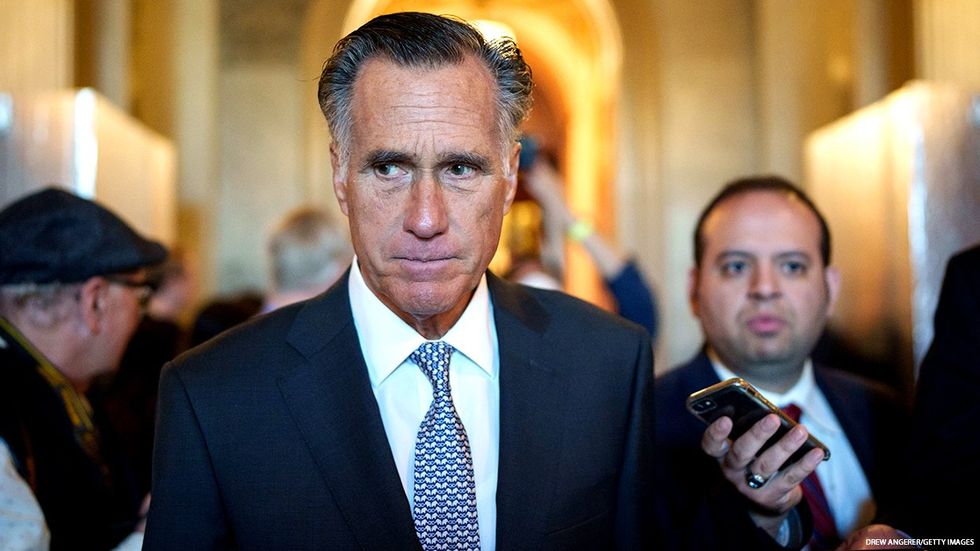U.S. Sen. Mitt Romney of Utah, who has emerged as one of the more reasonable Republicans in Congress, has announced he won’t seek reelection in 2024.
It’s time for younger generations to “step up” and “shape the world they’re going to live in,” Romney, 76, told The Washington Post in an interview published Wednesday ahead of his formal announcement. He would be into his 80s if he serves another six-year term in the Senate.
The Republicans’ 2012 presidential nominee and a former governor of Massachusetts, Romney has been one of the few GOP members willing to publicly criticize Donald Trump. He has done so ever since Trump entered politics, and he was the only Republican to vote for conviction in both of Trump’s impeachment trials. Shortly after Trump was elected president in 2016, he considered Romney for secretary of State during a brief period of cordiality between the two. “But [Romney’s] turnabout was short-lived,” the Post notes.
Romney is also critical of President Joe Biden and of the chaos the senator sees in the U.S. House of Representatives, which has a Republican majority in which far-right Trump loyalists are the dominant forces.
“It’s very difficult for the House to operate, from what I can tell,” he told the Post, “and two, and perhaps more importantly, we’re probably going to have either Trump or Biden as our next president. And Biden is unable to lead on important matters and Trump is unwilling to lead on important matters.”
Romney has a poor record on LGBTQ+ issues but has become somewhat more supportive over the years. During the first two years of his term in the Senate, to which he was elected in 2018, he had a score of seven out of a possible 100 on the Human Rights Campaign’s Congressional Scorecard. That rose to 31 in the second two years. Each two years represent a session of Congress.
When he ran against President Barack Obama in 2012, he indicated he would defend the Defense of Marriage Act, which prevented the federal government from recognizing same-sex marriages — making many benefits unavailable to same-sex couples — and allowed states to deny recognition to such marriages that were performed in other states. Obama refused to let his administration defend the law in court, and it was struck down by the U.S. Supreme Court in 2013.
Last year, however, Romney voted for the Respect for Marriage Act, which wrote marriage equality into federal law, protecting it from future court action. He was one of 12 Senate Republicans who did so.
Despite having claimed to “favor gay rights” back in 2011, however, Romney hasn’t taken many other actions in support of the LGBTQ+ community. When running for U.S. Senate from Massachusetts in 1994 (he lost to incumbent Edward Kennedy), he said he supported the Employment Non-Discrimination Act, but amid criticism from fellow Republicans, he had to walk back that stance. ENDA has never passed and has now been superseded by the Equality Act, a broader antidiscrimination bill that is still pending in Congress. He has not signed on as a cosponsor of the Equality Act.
In 2021, he spoke out against allowing transgender female student athletes to play on teams comporting with their gender identity. “I’ve got pictures of my eight granddaughters ... they shouldn’t be competing with people who are physiologically in an entirely different category,” he said during a hearing on Miguel Cardona’s nomination for secretary of Education. He did end up voting to confirm Cardona, who supports trans inclusion.
He voted against confirming Rachel Levine, a trans woman, as assistant secretary for health in the Department of Health and Human Services. He voted for the confirmation of gay man Pete Buttigieg as secretary of Transportation. In his votes on other high-profile Biden nominees, he was notably one of only three Republicans to support the confirmation of Ketanji Brown Jackson to the U.S. Supreme Court. She is the first Black woman on the court.
Although showing a degree of independence from his party, Romney still has been reliably conservative. He is opposed to abortion rights, saying the procedure should be legal only if a pregnancy results from rape or incest, or is life-threatening. He praised last year’s Supreme Court ruling in Dobbs v. Jackson Women’s Health Organization, which struck down Roe v. Wade and its national guarantee of abortion rights.
His breaks with the party have cost him some popularity in deep-red Utah, but he said that was not a factor in his decision not to seek a second Senate term. A recent poll in the state showed him with a 56 percent approval rating, he pointed out to the Post. He is “the highest-achieving Mormon politician of his time,” the paper notes.
“I think it’s fair to say that the support I get in Utah is because people respect someone who does what they believe is right, even if they disagree with me,” he said in the interview.



















































































